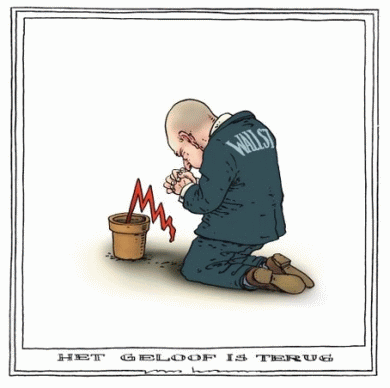
'THE RETURN OF FAITH'
[Het
Parool, The Netherlands]
Clarin, Argentina
Financial Crisis
Shows Why U.S. is a Long Way from Toppling
"The U.S. economy is, like its
currency, the reserve and the most technologically advanced platform in the
world. Crises reveal more about the nature of a phenomenon than normalcy does.
U.S. productivity is as important to the structure of global power as the law
of gravity is to physics."
By Jorge Castro
Translated By Halszka Czarnocka
October 10, 2008
Argentina
- Clarin - Original Article (Spanish)
We are in a new phase of the
North American electoral process, when the race is about to enter the home stretch
toward the voting on the first Tuesday in November. The economy has become the
central theme on the electoral agenda, after the intensification of the
financial crisis and Congressional approval of the $700 billion rescue plan. In
this new phase, Democratic candidate Barack Obama is significantly ahead of
Republican John McCain in the crucial states, where the votes of White workers
with a minimal level of education and income are going to decide the election.
Last Friday, McCain withdrew
his campaign from the heavily industrial state of Michigan, which now has the
highest level of unemployment in the U.S.: 8.9%. In the auto industry alone,
390,000 jobs were lost in the past four years. In Michigan, Obama has a
nine-point lead over McCain, five of which have been gained in the last ten
days. Michigan seems to show the tendency sweeping other "blue
states" like Pennsylvania and Ohio - with a high proportion of working
people who voted for Hillary Clinton in the primaries and until recently
haven't connected with Obama.
In North American electoral
politics, the rules are clear: If McCain loses in two of those three states, he
will have lost the election. In its first phase, the electoral process was a
referendum on Obama. That is why this presidential contest is an anomaly in
2008. This is a Democratic year. The Democratic Party has a 15-point advantage
over the Republicans; in California, the biggest and richest state, there is a
20-point gap. The anomaly is the tie that has existed between Obama and McCain until
the last ten days.
Even now, the central
question of the election is: How come Obama has only 4 point advantage over
McCain in the national polls, three weeks after the collapse on Wall Street,
the deepening of the financial crisis and an increase in unemployment of
400,000 in September alone? All indications suggest that within the next ten
days, the trend of the November elections will be definitively set. If during
the presidential debates and accentuating his negative campaign, McCain doesn't
manage to transform the contest into a referendum on Obama, he will lose. In
that case, the next president of the United States will be the first
African-American to occupy the White House - while being, of course, a summa
cum laude graduate of Harvard.
What’s notable about the
position of the United States is the fact that in the midst of the crisis, as
the paralysis of interbank financial markets is growing more acute, foreign
demand for North American assets is increasing. In 2007, foreigners have put
more than $2 trillion of direct investment into U.S. companies, bonds and
stocks. More than 60 percent of came from private investors and the rest from
central banks - especially Asian and primarily Chinese - who bought nearly $1
trillion worth of U.S. Treasury Bonds. In this way, the $730 billion current
account deficit (5 percent of GDP in the second quarter of 2008) has been
covered, and there was enough left over to finance $1.3 trillion of investments
by Americans abroad.
Posted by WORLDMEETS.US
The United States receives
over 75 percent of the total flow of capital in the world, which amounts to $2
billion per day entering the U.S. market. This fact, which clarifies the real
structure of world power, has recently received some direct attention (Why
Do Foreigners Invest in the United States, By Kristin Forbes, MIT, April
2008  ). First, the productivity
of the North American economy makes its potential for long-term growth superior
to the rest of G-7; further, its larger size, liquidity, efficiency - and the
transparency of U.S. financial markets, when compared to those elsewhere, leads
the world to invest there, even in the midst of a major crisis.
). First, the productivity
of the North American economy makes its potential for long-term growth superior
to the rest of G-7; further, its larger size, liquidity, efficiency - and the
transparency of U.S. financial markets, when compared to those elsewhere, leads
the world to invest there, even in the midst of a major crisis.
As for why one would prefer
dollar assets - and the dollar as the preferred currency - while the financial
crisis deepens in its epicenter in the U.S., the tentative answer would be
that, as a last resort, the U.S. economy is, like its currency, the reserve and
the most technologically advanced platform in the world.
Crises reveal more about the
nature of a phenomenon than normalcy does. U.S. productivity is as important to
the structure of global power as the law of gravity is to physics.
CLICK HERE FOR SPANISH
VERSION
[Posted by WORLDMEETS.US
October 10, 5:30am]